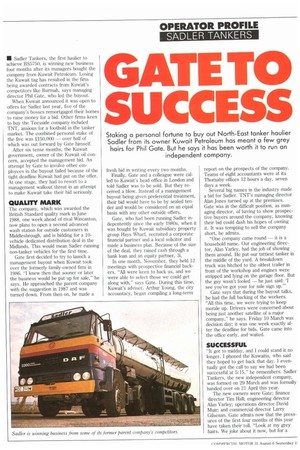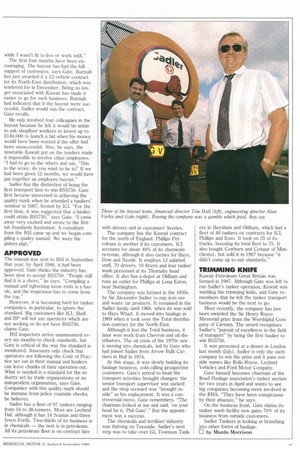GATE TO
Page 46

Page 47

If you've noticed an error in this article please click here to report it so we can fix it.
CCESS
• Sadler Tankers, the first haulier to achieve BS5750, is winning new business four months after its managers bought the company from Kuwait Petroleum. Losing the Kuwait tag has resulted in the firm being awarded contracts from Kuwait's competitors like Burmah, says managing director Phil Gate, who led the buyout.
When Kuwait announced it was open to offers for Sadler last year, five of the company's bosses remortgaged their homes to raise money for a bid. Other firms keen to buy the Teesside company included TNT, anxious for a foothold in the tanker market. The combined personal stake of the five was £150,000 — over half of which was out forward by Gate himself.
After six tense months, the Kuwait government, owner of the Kuwait oil concern, accepted the management bid. An attempt by Gate to involve other employees in the buyout failed because of the tight deadline Kuwait had put on the offer. At one stage, they had to resort to a management walkout threat in an attempt to make Kuwait take their bid seriously.
QUALITY MARK
The company, which was awarded the British Standard quality mark in June 1988, one week ahead of rival Wincanton, now plans to open a second advanced wash station for outside customers in Middlesbrough, and is bidding for a 10vehicle dedicated distribution deal in the Midlands. This would mean Sadler running non-tanker vehicles for the first time.
Gate first decided to try to launch a management buyout when Kuwait took over the formerly family-owned firm in 1986. "I knew then that sooner or later the business would be put up for sale," he says. He approached the parent company with the suggestion in 1987 and was turned down. From then on, he made a fresh bid in writing every two months.
Finally, Gate and a colleague were called to Kuwait's head office in London and told Sadler was to be sold. But they received a blow. Instead of a management buyout being given preferential treatment, their bid would have to be by sealed tender and would be considered on an equal basis with any other outside offers.
Gate, who had been running Sadler indepentently since the early 1980s, when it was bought by Kuwait subsidiary property group Hays Wharf, recruited a corporate financial partner and a local solicitor and made a business plan. Because of the size of the deal, they raised cash through a bank loan and an equity partner, 3i.
In one month, November, they held 12 meetings with prospective financial backers. "All were keen to back us, and we were able to select those we could get along with," says Gate. During this time, Kuwait's adviser, Arthur Young, the city accountacy, began compiling a long-term report on the prospects of the company. Teams of eight accountants were at its Thornaby offices 12 hours a day, seven days a week.
Several big names in the industry made a bid for Sadler. TNT's managing director Alan Jones turned up at the premises. Gate was in the difficult position, as managing director, of having to show prospective buyers around the company, knowing their bid could dash his hopes of owning it. It was tempting to sell the company short, he admits.
"One company came round — it is a household name. Our engineering director, Alan Varley, had the job of showing them around. He put our tattiest tanker in the middle of the yard. A breakdown truck was hitched to the oldest trailer in front of the workshop and engines were stripped and lying on the garage floor. But the guy wasn't fooled — he just said: 'I see you've got your for sale sign up."
Gate says that during the buyout talks, he had the full backing of the workers. "All this time, we were trying to keep morale up. Drivers were concerned about being just another satellite of a major company," he says. Friday 10 March was decision day; it was one week exactly after the deadline for bids. Gate came into the office early, and waited.
SUCCESSFUL
"It got to midday, and I could stand it no longer. I phoned the Kuwaitis, who said they hoped to get back that day. I eventually got the call to say we had been successful at 5:15," he remembers. Sadler Tankers, the new independent company, was formed on 29 March and was formally handed over on 21 April this year.
The new owners were Gate; finance director Tim Hall; engineering director Alan Varley; operations director David Muir; and commercial director Larry Gilsenan. Gate admits now that the pressures of the first four months of this year have taken their toll. "Look at my grey hairs. We joke about it now, but for a while I wasn't fit to live or work with."
The first four months have been encouraging. The buyout has had the full support of customers, says Gate. Bunnah has just awarded it a 12-vehicle contract for its North-East distribution, which was tendered for in December. Being no longer associated with Kuwait has made it easier to go for such business. Bunnah had indicated that if the buyout were successful, Sadler would win the contract, Gate recalls.
He only involved four colleagues in the buyout because he felt it would be unfair to ask shopfloor workers to invest up to £140,000 to launch a bid when his money would have been wasted if the offer had been unsuccessful. Also, he says, the timetable Kuwait put on the tenders made it impossible to involve other employees. "I had to go to the others and say, "This is the score; do you want to be in?' If we had been given 12 months, we would have put together an employee buyout."
Sadler has the distinction of being the first transport firm to win BS5750. Gate first became interested in achieving the quality mark when he attended a hauliers' seminar in 1987, hosted by ICI. "For the first time, it was suggested that a haulier could attain BS5750," says Gate. "I came away very excited and wrote to the British Standards Institution. A consultant from the BSI came up and we began compiling a quality manual. We were the guinea pigs."
APPROVED
The manual was sent to BSI in September that year; by April 1988, it had been approved. Gate thinks the industry has been slow to accept BS5750. "People still find it is a chore," he says. "Compiling a manual and tightening loose ends is a hassle, and the inspiration has to come from the top."
However, it is becoming hard for tanker companies, in particular, to ignore the standard. Big customers like ICI, Shell and BP will not use operators which are not seeking or do not have BS5750, claims Gate.
BSI inspectors arrive unannounced every six months to check standards, but Gate is critical of the way the standard is monitored. Assessors only check that operators are following the Code of Practice set out in their manual and hauliers can leave chunks of their operation out. What is needed is a standard for the industry set by trade organisations or an independent organisation, says Gate. Companies with this quality mark should be immune from police roadside checks, he believes.
Sadler has a fleet of 97 tankers ranging from 16 to 38-tonners. Most are Leyland Daf, although it has 14 Scanias and three Iveco Fords. Two-thirds of its business is in chemicals — the rest is in petroleum. All its petroleum fleet is on contract hire with drivers and in customers' liveries.
The company has the Kuwait contract for the north of England. Phillips Petroleum is another if its customers. ICI accounts for about 40% of its chemicals revenue, although it also carries for Hays, Dow and Nestle. It employs 12 salaried staff, 70 drivers, 10 fitters and four tanker wash personnel at its Thornaby head office. It also has a depot at Oldham and runs an outlet for Phillips at Long Eaton, near Nottingham.
The company was formed in the 1850s by Sir Alexander Sadler to mix iron ore and waste tar products. It remained in the Sadler family until 1966, when its was sold to Hays Wharf. It moved into haulage in 1969 when it took over the Total distribution contract for the North-East.
Although it lost the Total business, it later won work from Chevron and oil distributors. The oil crisis of the 1970s saw it moving into chemicals, led by Gate who had joined Sadler from Arrow Bulk Carriers in Hull in 1974.
At this stage, it was slowly building its haulage business, cold-calling prospective customers. Gate's arrival to head the transport activities brought changes: the senior transport supervisor was sacked and the shop steward was "brought inside" as his replacement. It was a controversial move, Gate remembers. "The chairman looked at me and said, 'on your head be it, Phil Gate'." But the appointment was a success.
The chemicals and fertiliser industry was thriving on Teesside. Sadler's next step was to take over GL Townson Tank ers in Heysham and Oldham, which had a fleet of 40 tankers on contracts for ICI, Phillips and Esso. It took on 25 of its trucks, boosting its total fleet to 75. It also bought Cowburn and Cowpar of Manchester, but sold it in 1987 because "it didn't come up to our standards."
TRIMMING KNIFE
Kuwait Petroleum Great Britain was formed in 1987. Although Gate was left to run Sadler's tanker operation, Kuwait was wielding the trimming knife, and Gate remembers that he felt the tanker transport business would be the next to go.
Most recently, the company has just been awarded the Sir Henry Royce Memorial prize from the Worshipful Company of Carmen. The award recognises Sadler's "pursuit of excellence in the field of transport" by being the first haulier to win BS5750.
It was presented at a dinner in London last month (July). Sadler is only the sixth company to win the prize and it joins notable names like Rolls-Royce, Leyland Vehicles and Ford Motor Company.
Gate himself becomes chairman of the Road Haulage association's tanker section for two years in April and wants to see big companies becoming more involved in the RI-IA. "They have been conspicuous by their absence," he says.
On the business front, Gate claims its tanker wash facility now gains 70% of its business from outside customers.
Sadler Tankers is looking at branching into other forms of haulage.
by Murdo Morrison
































































































































